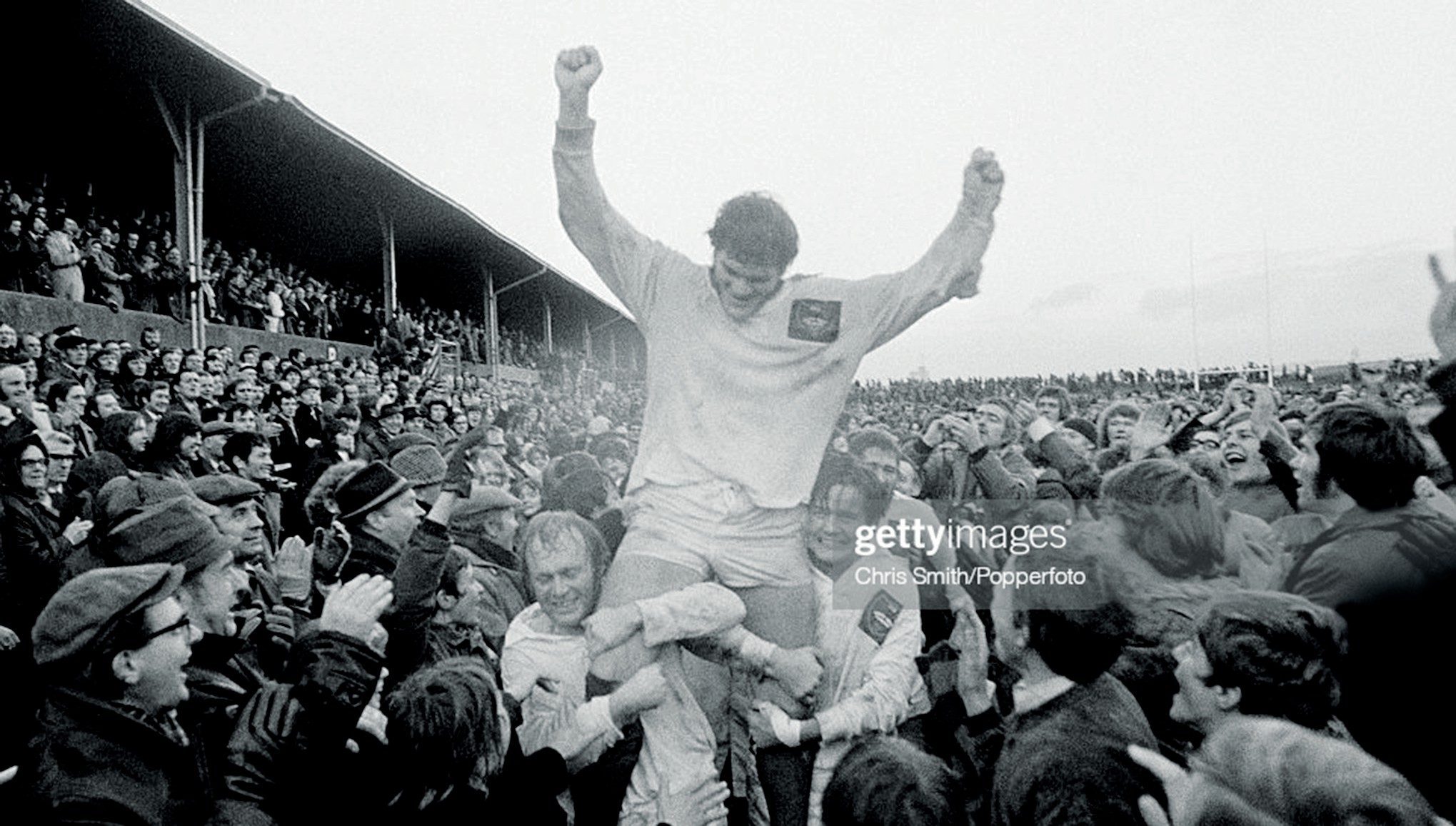Captain Fran rides atop the sea of happy faces

Brendan Gallagher delves into some of rugby‘s most enduring images, their story and why they are still so impactful
Iconic Rugby Pictures: PART 79
Fran Cotton chaired off after North West beat New Zealand November 22, 1972
What’s happening here?
It’s November 22, 1972, at Ellis Sports Ground Workington, an unlikely Rugby Union venue on the estuary of the River Derwent to the north-west of the Lake District. The North West Counties – consisting of Lancashire, Cheshire, Cumberland and Westmorland – have just beaten the All Blacks 16-14 and are chairing off their skipper for the day Fran Cotton.
What’s the story behind the picture?
The big story here is the first-ever defeat of the All Blacks by an English region or club side, an occasion that was to become the lead item on the BBC’s Sportsnight with David Coleman just a few hours after the final whistle.
New Zealand tours were rare and momentous events in those days and it was a huge deal for such an “unfashionable” side to down their colours in such an out-of-the-way venue even if the Lions series win the previous summer had dented New Zealand’s aura of absolute invincibility.
Although the North West might have been “unfashionable” they had talent enough. Cotton, Tony Neary and Peter Dixon were world class forwards and the likes of lock Dick Tricky and flanker Dave Robinson should have won Test caps.
Steve Smith and Alan Cowman were exciting Loughborough half-backs while wider out Dave Roughly, Chris Wardlow and Barry O’Driscoll picked up a smattering of caps, the latter with Ireland. And as a team the North West had a strong sense of identity, they didn’t feel like some random combination, although New Zealand were unquestionably big favourites.
“The victorious gladiator hoisted high on teammates’ shoulders, arm aloft”
As Cotton recalls: “Back in August our coach John Burgess had gathered us for our first training session and insisted we were going to win which caused a bit of mirth. I’m not sure many of us had actually considered that possibility. Anyway we trained for about seven Sunday mornings in a row before the game which took a lot of commitment and on the day we were, frankly, very good value for our win.”
Burgess was a massive figure in this story. Known for his rousing team talks when coaching Lancashire, he excelled himself this time, ripping his shirt off to deliver a messianic speech in his string vest, a tirade which concluded with him smashing his fist down on a table in the middle of the changing room. Unfortunately that was where the team had all put their empty sherry glasses having downed a schooner apiece for Dutch courage in a pre-match ritual. Shattered glass everywhere.
What happened next?
The North West stormed to a memorable and well deserved win with the headline act being Richmond wing Stuart Maxwell, who raced in for a brace of tries. The All Blacks weren’t overly pleased and it was reasonably lively after the match as well with both teams congregating at a local hotel for the post-match dinner.
Cotton again: “Later that night in the TV room – hotels had them back then – the Kiwis wanted to watch highlights of the Ali-Foster fight that had taken place in the USA overnight. We on the other hand were pretty keen to watch Sportsnight with Coleman which had our match highlights and an interview with Carwyn James discussing the events of the day.
“The Kiwis turned on the boxing at which point Chris Wardlow, who could be a bit mad, got up and turned it back to BBC for the rugby. This didn’t amuse Keith Murdoch – who hadn’t been playing that day. Keith basically lifted Chris up bodily by his hair and evicted him from the room. At which point it all got a bit tasty before we decided we wanted to watch the rugby more than we wanted another fight so we went to a nearby pub.”
Why is the picture iconic?
The victorious gladiator being hoisted high on teammates’ shoulders, arms aloft with triumph, is one of sport’s enduring images and this grainy black and white picture, hurriedly snapped, is a particularly emotive version of the genre.
You can feel the spontaneity and, yes, the shock and surprise from the thronging crowd. You can also feel their energy and awe at having been witnesses to history. It seems very murky…but that’s not just the dank November weather. Next to the ground was a huge steelwork which belched out eye-watering sulphurous clouds for much of the afternoon.
Cotton, still a Loughborough University student at this stage, was never one for histrionics and is looking slightly embarrassed by the fuss while managing to enjoy it nonetheless. Ellis Sports Ground was – is and remains –a small ground but they reckon there were 15,000 fans there that day and the background of this picture is just a sea of happy faces.
Footnote: Cotton and Tony Neary in particular were to enjoy further success against the All Blacks. The following summer they starred in England’s famous 16-10 win in Auckland while that duo along with Peter Dixon and Steve Smith were also on duty in 1979 when the North famously lowered the All Blacks colours at Otley.